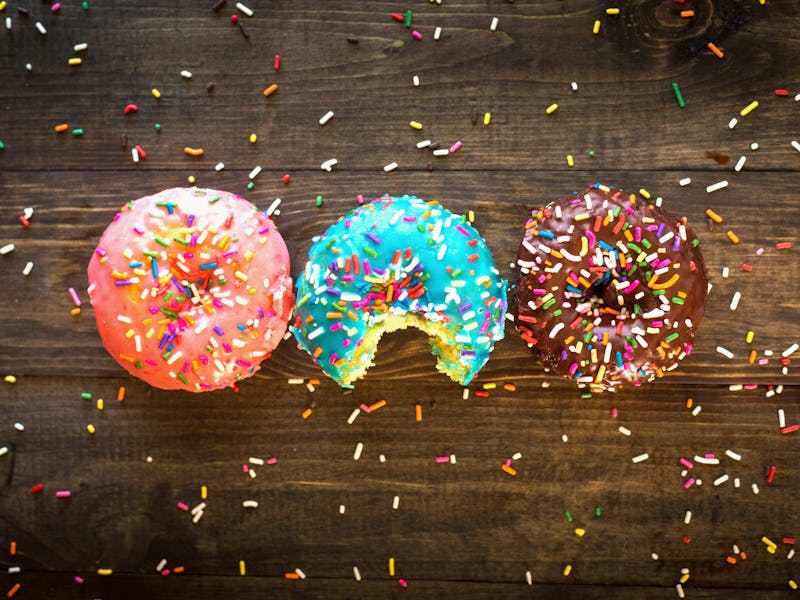A Classic Economics Law Reveals a Link Between “Taste Perception” and Obesity
Differences in taste could play a role in overeating and obesity.

At this point, it’s clear that obesity isn’t just caused by one thing — its influenced by circuits in the brain, or other biological factors. A team of health economists believes that one of the contributors might be very simple: what if food just tastes better to people who struggle with obesity?
A study published Monday in The Journal of The Academy of Nutrition and Dietetics suggests this might be the case, adding yet another reason that eating can feel hard to stop.
In a chocolate-tasting experiment conducted at the University of Iowa, a team of scientists showed that people who struggle with obesity seem to experience food differently than people who are overweight or at a normal weight. In the paper, they suggest that obese people have a “higher levels of initial taste perception” — which means that the first bite of a meal tends to taste extra good to them. But that powerful, and pleasurable, taste sensation also lingers over the course of the meal. The 12th bite may still taste better to someone with obesity than it would to someone at a normal weight.
Linnea Polgreen, Ph.D., the study’s lead author, tells Inverse that this heightened tasting experience could help explain ties between overeating and obesity:
“Our results may help explain why individuals who are obese may have a tendency for consuming more calories than non-obese individuals,” Polgreen says.
Obese people tended to enjoy their food more in a chocolate tasting experiment done by scientists at the University of Iowa.
Polgreen is a health economist at the University of Iowa, and her findings are based on a concept that’s more at home in economic theory. In basic economics, there’s an idea called the Law of Diminishing Marginal Utility, which boils down to the idea that the more you consume something the less you enjoy it.
Food is the typical example used to illustrate this idea, as Polgreen says in a podcast run by the The Journal of The Academy of Nutrition and Dietetics. That first bite of chocolate may be great, but if you keep eating the whole bar (or maybe two or three) the novelty and enjoyment tends to wear off as it fills you up.
It turns out that this idea also applies to obesity science. People at normal weights, or people who were slightly overweight tended to see steady declines in how much they enjoyed their chocolate samples. But Polgreen and her co-authors found that this decline isn’t as strong for people with obesity. Their enjoyment of food still dropped off as they ate more and more chocolate, but not as quickly as it did for people closer to normal weight.
In their experiment, Polgreen and her team demonstrated this by letting 290 participants (50 obese participants) people eat as much chocolate as they wanted. After each sample, they rated how much they enjoyed the treat, and how full they felt afterwards. On average, people ate ten pieces of chocolate over the course of roughly half an hour.
Obese individuals tender to enjoy their chocolate samples more at the beginning of the experiment. And they continued to enjoy them more than people at normal weights even as they ate more and more.
That experiment showed clear distinctions between the obese participants, and the overweight or normal-weight people. On average, the obese individuals tended to report that the chocolate tasted half a point better on a scale of one to ten.
Like the other groups, obese participants started to get sick of the chocolate over time. But they got sick of it at a slower rate: it took 12.5 pieces of chocolate to feel the same level of distaste that non-obese participants felt after 10 pieces. In this experiment, those 2.5 pieces of chocolate amounted to 67.5 extra calories, but in a larger meal, that could add up to a lot more.
Still, there are some open questions, though. We still don’t know whether people who develop obesity may already have better taste perception, or whether it’s something that develops over time. Polgreen is hopeful we might find some kind of biological explanation for her effect to solidify her results. But in this study, the team wasn’t specifically looking for one:
“We hope to answer these questions in future studies,” says Polgreen.
Right now, she’s working with an idea that’s rooted in economics. But if her results hold up over time, could help explain overeating too.
Partial Abstract:
Objective: To quantify the satisfaction obtained from eating one specific food, choco- late, by measuring taste perception as normal-weight, overweight, and obese partici- pants consumed additional pieces of chocolate. To measure the effect of nutritional information on chocolate consumption.
Design: Randomized, controlled trial. Participants/setting We analyzed data on 290 adults; 161 had a body mass index (BMI) that was considered normal (<25), 78 had a BMI considered overweight (!25 and <30), and 51 had a BMI considered obese (!30).
Intervention: Participants were given samples of chocolate, one at a time, until they chose to stop eating. With each sample, participants were given a questionnaire. Half of the study participants were randomly selected to receive nutritional information (n1⁄4150).
Results: Study participants consumed between 2 and 51 pieces of chocolate with a mean of 12.1 pieces. Average taste perception decreased with each piece. We found no significant difference in taste perceptions between normal- and overweight partici- pants. However, obese participants had higher levels of initial taste perception than normal- and overweight participants (P1⁄40.02). Also, obese participants reported taste perceptions that declined at a more gradual rate than normal- and overweight partic- ipants (P<0.01). Self-reported hunger, prior to the study, affected taste perception, but providing nutritional information did not.
Conclusions: Obese participants started with higher levels of perceived taste and also experienced slower rates of decline than did normal-weight and overweight individuals.